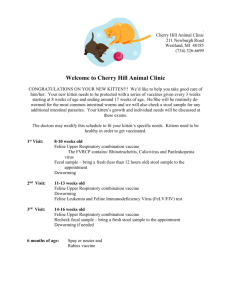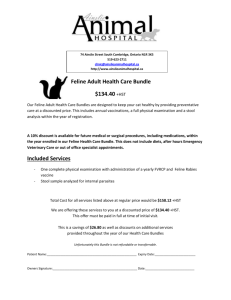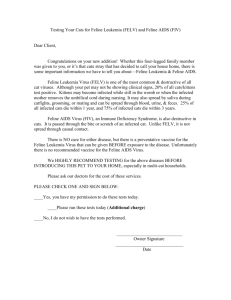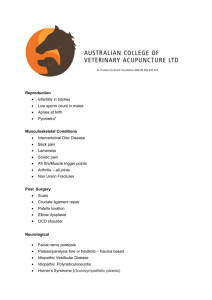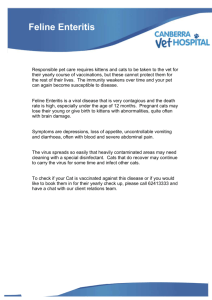Core Feline Vaccines vs - Abbott Animal Hospital
advertisement
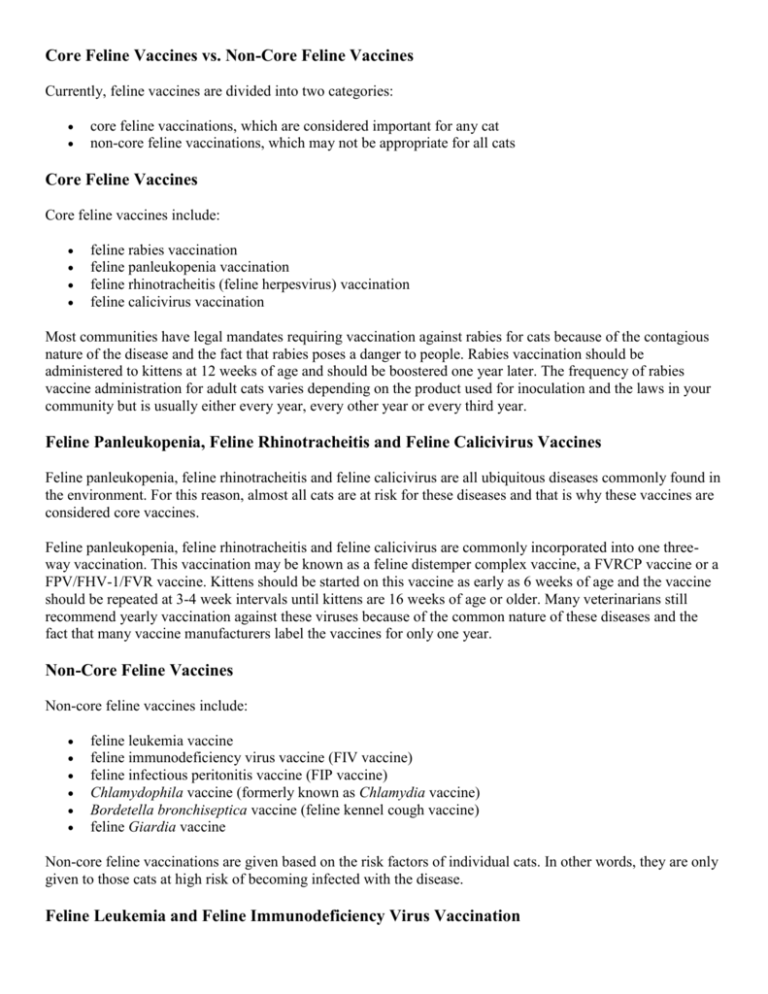
Core Feline Vaccines vs. Non-Core Feline Vaccines Currently, feline vaccines are divided into two categories: core feline vaccinations, which are considered important for any cat non-core feline vaccinations, which may not be appropriate for all cats Core Feline Vaccines Core feline vaccines include: feline rabies vaccination feline panleukopenia vaccination feline rhinotracheitis (feline herpesvirus) vaccination feline calicivirus vaccination Most communities have legal mandates requiring vaccination against rabies for cats because of the contagious nature of the disease and the fact that rabies poses a danger to people. Rabies vaccination should be administered to kittens at 12 weeks of age and should be boostered one year later. The frequency of rabies vaccine administration for adult cats varies depending on the product used for inoculation and the laws in your community but is usually either every year, every other year or every third year. Feline Panleukopenia, Feline Rhinotracheitis and Feline Calicivirus Vaccines Feline panleukopenia, feline rhinotracheitis and feline calicivirus are all ubiquitous diseases commonly found in the environment. For this reason, almost all cats are at risk for these diseases and that is why these vaccines are considered core vaccines. Feline panleukopenia, feline rhinotracheitis and feline calicivirus are commonly incorporated into one threeway vaccination. This vaccination may be known as a feline distemper complex vaccine, a FVRCP vaccine or a FPV/FHV-1/FVR vaccine. Kittens should be started on this vaccine as early as 6 weeks of age and the vaccine should be repeated at 3-4 week intervals until kittens are 16 weeks of age or older. Many veterinarians still recommend yearly vaccination against these viruses because of the common nature of these diseases and the fact that many vaccine manufacturers label the vaccines for only one year. Non-Core Feline Vaccines Non-core feline vaccines include: feline leukemia vaccine feline immunodeficiency virus vaccine (FIV vaccine) feline infectious peritonitis vaccine (FIP vaccine) Chlamydophila vaccine (formerly known as Chlamydia vaccine) Bordetella bronchiseptica vaccine (feline kennel cough vaccine) feline Giardia vaccine Non-core feline vaccinations are given based on the risk factors of individual cats. In other words, they are only given to those cats at high risk of becoming infected with the disease. Feline Leukemia and Feline Immunodeficiency Virus Vaccination Risk factors for developing feline leukemia and feline immunodeficiency virus involve cats which socialize with or fight with other cats frequently. Thus, cats which live outdoors are frequently vaccinated for these diseases whereas cats which live only indoors are not. Cats should be blood tested for both diseases before vaccination and only cats testing negative should be vaccinated. Feline leukemia vaccines are started at 8 to 12 weeks of age, with a booster 3-4 weeks later. The AAFP has recommended that all kittens be vaccinated against feline leukemia. For adult cats at risk of exposure, feline leukemia vaccine is recommended on a yearly basis. Vaccination against feline immunodeficiency virus remains controversial within the veterinary community because of the fact that vaccination results in a positive blood test which cannot be distinquished from a positive blood test obtained from a cat infected with FIV. Therefore, a vaccinated cat could potentially be misidentified as a cat infected with FIV and may end up being euthanized. For this reason, many veterinarians are concerned that the vaccine may do more harm than good. For cats at risk, the FIV vaccine is administered in a series of three boosters given at 2-3 week intervals and started at 8 weeks of age. For adult cats at risk, FIV vaccine is administered yearly. Feline Chlamydophila Vaccination and Feline Bordetella bronchiseptica Vaccination Vaccinations against feline Chlamydophila and feline kennel cough are only recommended for cats which are to be introduced into an area where the diseases are known to be in existence. Cattery situations are the most likely to benefit from these vaccines, but these vaccines are not usually needed for the average cat. Feline Infectious Peritonitis and Feline Giardia Vaccinations Vaccines against feline infectious peritonitis and feline Giardia are not generally recommended due to questions regarding the efficacy and/or the safety of these vaccines. The feline Giardia vaccination has been suggested as a therapeutic agent in cats which are already infected with Giardia but its use for the prevention of this disease is questionable.

